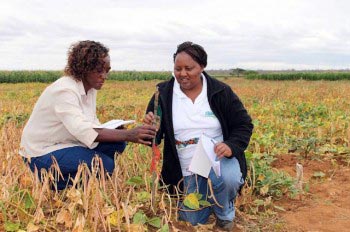RELEASE OF 26 COMMERCIAL MAIZE VARIETIES DURING CAREER
 International Women’s Day on March 8, offers an opportunity to recognize the achievements of women worldwide. This year, CIMMYT asked readers to submit stories about women they admire for their selfless dedication to either maize or wheat. In the following story, Judith Oyoo writes about her Super Woman of Maize, Jane Ininda, an agricultural scientist.
International Women’s Day on March 8, offers an opportunity to recognize the achievements of women worldwide. This year, CIMMYT asked readers to submit stories about women they admire for their selfless dedication to either maize or wheat. In the following story, Judith Oyoo writes about her Super Woman of Maize, Jane Ininda, an agricultural scientist.
Dr. Jane Ininda is an agricultural scientist who has been making great strides in agricultural research with remarkable results.
She was born in humble surroundings, in Mbeere District, in Kenya. Her parents were farmers whose crop yields were far from satisfactory.
“I remember as I was growing up that there wasn’t enough food; we used traditional methods and you could never be sure there would be enough food in the year,” Ininda recalled.
A graduate of Iowa State University, she began her academic journey in Eastern Province, Kenya at Kaaga Girls High School, University of Nairobi where she earned bachelor’s and master’s degrees before joining Iowa State University to study for her doctoral degree.
Dr. Ininda has released 26 commercial maize varieties during a career that spans more than 30 years. In collaboration with other partners she has released more than 180 hybrid maize varieties that have been commercialized.
She has contributed to food security, employment and wealth creation to smallholder farmers in Africa.
Dr. Ininda believes in the saying: “Give a hungry person a fishing hook and they will never be hungry again in their lifetime.”
In this case, the “fishing hook” is crop varieties, especially disease-resistant, high-yielding maize with improved taste and the ability to mature early.
In addition to her professional excellence, she has mentored many upcoming young scientists without considering gender.
She is hardworking, determined, focused, intelligent, humble and soft spoken, although she is a giant in the world of research.
She believed in me when I was naïve, having recently graduated from Kenya’s Egerton University. She involved me in her project, taught me how to carry out experiments, data collection and team work.
I gained invaluable research experience under her mentorship, although informal. One way to sum her up: “Priceless gem to Africa.”
Any views expressed in this article are those of the author and not of the International Maize and Wheat Improvement Center.
 Gender equality, youth and social inclusion
Gender equality, youth and social inclusion